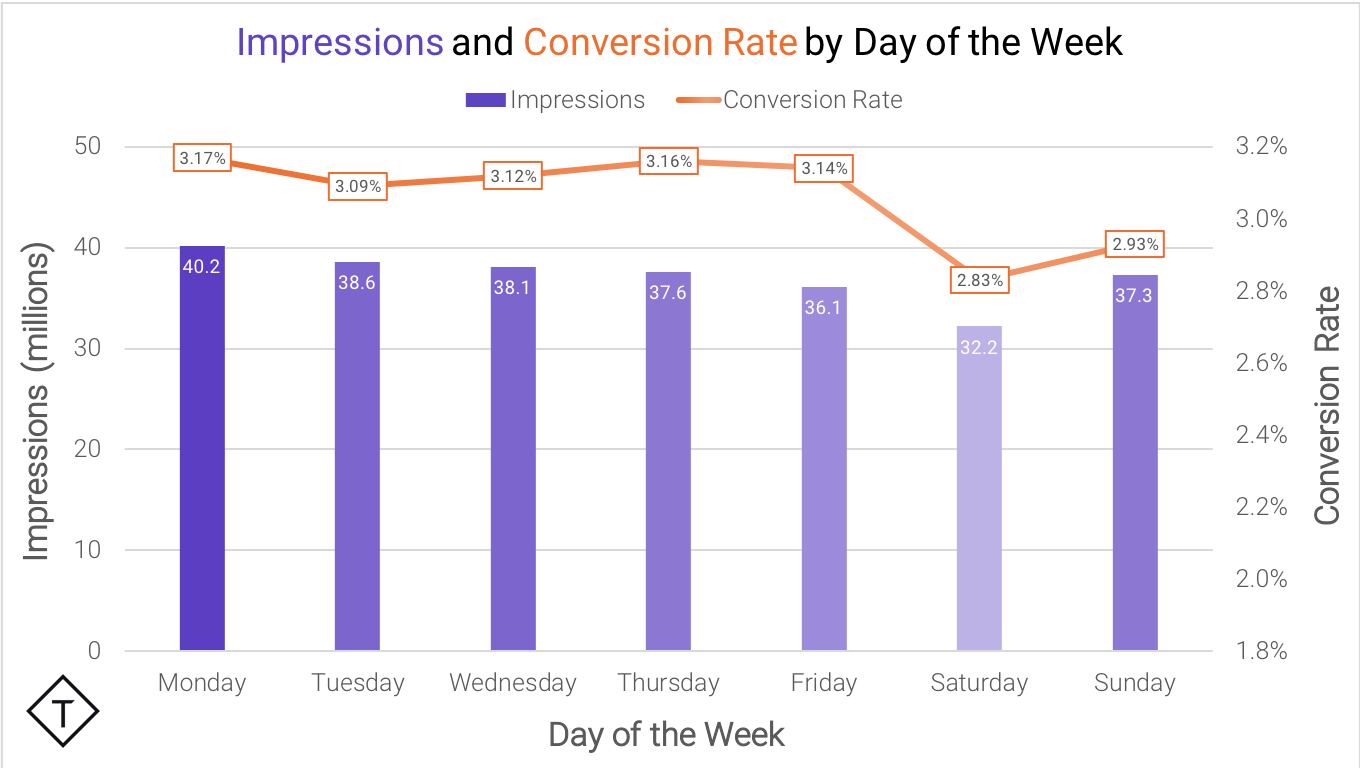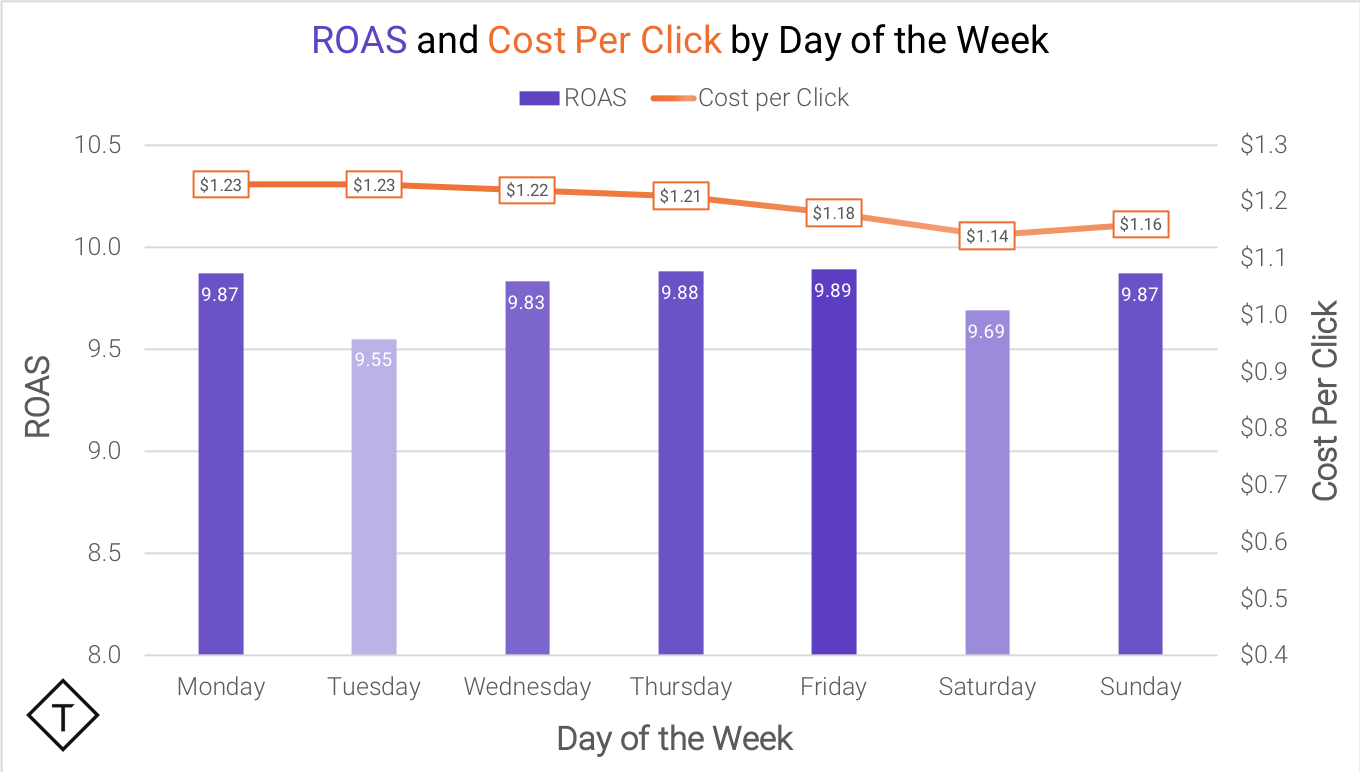A successful metasearch bidding strategy is far from one-size-fits-all. Adapting to macro behavioral trends as they emerge is essential for any enterprising hotel looking to employ an effective approach to acquisitions, and a fundamental part of ensuring your hotel attracts high-value guests that are likely to convert on your direct channel.
We’ve already seen how ROAS (return on ad spend) varies across device type and ad position. Now, we’re taking a closer look at how seasonality and the day of the week can impact your conversion rate, and therefore your return, on metasearch. What time of the year can you afford to bid high? And when should you pull back your spend? One thing’s for certain - a successful blueprint for metasearch must continuously respond to the changing dynamics of guest behavior.
Friday, I’m in love with metasearch?
It turns out that people are not only dreaming of their next trip abroad, but are actually most likely to make a booking at the start of the working week. Across our extensive data analysis, Monday had 40.2 million impressions and a conversion rate of 3.17% - both higher than any other day of the week. While these metrics remain relatively consistent and only see a marginal decline across the rest of the weekdays, both impressions and conversion rate drop off sharply at the weekend. There was far less interest in metasearch on Saturdays, which had the smallest share of impressions and the lowest conversion rate at 32.2 million and 2.83% respectively - not only were fewer people searching, but there was also lower purchasing intent from those who were.

While the weekend may not be the most prolific in terms of attracting and converting guests on metasearch, the Cost Per Click (CPC) across these two days is the lowest across the entire week. This is not particularly surprising, as lower traffic will mean less competition within auctions (and therefore cheaper CPC) on these days than across the busier working week. Both Monday and Tuesday have the most expensive CPC at $1.23 and, mirroring the trend for impressions, the cost steadily declines across the working week to a low of $1.14 on Saturday.

So, which day of the week provides hotels with the greatest Return On Ad Spend (ROAS) for their metasearch listings? According to our statistics, Friday provides the best ROAS of the week at 9.89 - this is due to an effective combination of the second-lowest CPC, a relatively high conversion rate of 3.14% and a still-significant impression share. Monday is a close second with a ROAS of 9.87. Despite the highest impression share and conversion rate, the correspondingly high CPC on Monday bids impacts the return on spend. The trend for ROAS does not exactly mirror that of any individual metric: hotels need a holistic perspective that takes into account a combination of factors when determining their bidding strategy.
Take me back to November
Broadening of the scope of the analysis reveals that CPC, and therefore ROAS, changes even more significantly across the months of the year. The difference between the highest and lowest recorded months for ROAS and CPC is far greater than that for days of the week - for example, while $100 would see a return of around $1000 in November, this would potentially drop off to only $800 in December.
We can see a clear negative correlation between ROAS and CPC - with the exception of November, when CPC goes down and ROAS goes up. There are also some thought-provoking seasonal trends, with ROAS ramping up in Autumn and hitting a peak of 10.5 in November, and then steadily declining to 8.71 in May. This suggests that traffic is getting more expensive as we move into the traditional summer holiday season - could this be because guests on metasearch at this time have more intent to book due to winter blues and are more likely to convert? With December providing the lowest return of any month at a relatively meagre 8.45, it’s hard to tell - although this does confirm that ROAS is affected by more than just CPC.
The flow of time is always cruel
Just like in our analysis the impact of ad position on ROAS, it’s tempting to conclude that Friday and November are the best times to bid and divide up your advertising budget accordingly. However, success at metasearch is all about knowing how these macro trends are evolving actively over time, and adapting how much you’re bidding in real-time as these patterns emerge. This requires either a dedicated team of experts or a technological solution that can intelligently target those who have the highest propensity to book.
While the paradigm presented in this article provides a fascinating snapshot of the state of this crucial distribution channel, these statistics are constantly changing as the metasearch landscape and hospitality industry at large continue to evolve. Being aware of the dynamics of metasearch is a fantastic starting point that can put you ahead of the competition, but this is only the first step. Hotels looking to drive OTA-levels of volume direct at substantially cheaper prices need not only a change of investment, but also a change in their mindset towards meta.
Want to see even more key best-practices and shocking statistics around meta? Take a look at the first article in our surprising truths around metasearch series, which explores the impact of ad position on ROAS.
If you'd also like to see how the Triptease platform can help your hotel make smarter metasearch bidding decisions to acquire and convert more guests through your direct channel, get in touch to learn more!
